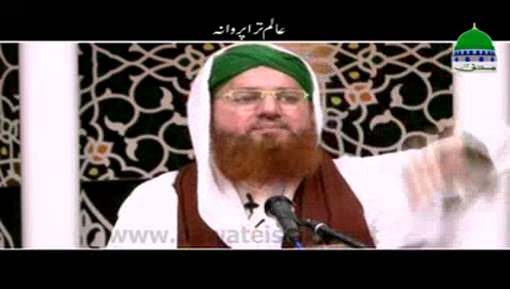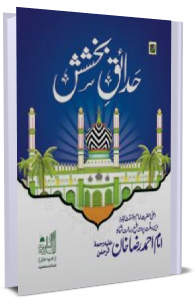
Scenes of the Universe and Hadaiq-e-Bakhshish
Muhammad Hamid Siraaj Attari Madani
This universe is full of beautiful landscapes and everyone looks at these landscapes and scenes from their own point of view. A scientist looks at them in the light of his science, a geographer looks at them from a geographical perspective, and a chemist observes them from the point of view of chemistry. However, the great A’la Hadrat, Imam Ahmad Raza Khan رَحْمَةُ الـلّٰـهِ عَلَيْه, a true devotee of the Prophet, would look at all of these scenes from the point of view of Prophetic love, and he would express his observations in the form of his poetry praising the Beloved Prophet صَلَّى الـلّٰـهُ عَلَيْهِ وَاٰلِهٖ وَسَلَّم. In his poetry on Prophetic praise, Hadaiq-e-Bakhshish, many scenes of nature have been explained in this light, immersed in the love of the Prophet صَلَّى الـلّٰـهُ عَلَيْهِ وَاٰلِهٖ وَسَلَّم.
The Sun and the Imagination of Raza
The sun is one of these beautiful things from the landscape around us. It is the sun that is illuminating the whole world with its light. It is the sun that has been shining onto the world for thousands of years without its light diminishing. It is the sun from whose rising and setting the system of the world is running and it truly has a central position in the scenes of the universe. Now, let’s look at the reality of this sun in the book of love of A’la Hadrat Imam Ahmad Raza Khan رَحْمَةُ الـلّٰـهِ عَلَيْه. When the Beloved Prophet صَلَّى الـلّٰـهُ عَلَيْهِ وَاٰلِهٖ وَسَلَّم is mentioned, he says:
Jis ko qurs-e-mehr samjha hay jahan ay mun’imo!
Un kay khwaan-e-jood say hay ik naan-e-saukhtah
O the wealthy! What the whole world deems as the disc of the sun
Merely is a piece of scorched bread from his generous table-spread
(Hadaiq-e-Bakhshish, p. 136)
In other words, ‘O crowned ones! O kings! While the whole world calls this ball of light ‘the sun’, in reality, it is merely a piece of burnt bread from the dining mat of the Beloved Prophet صَلَّى الـلّٰـهُ عَلَيْهِ وَاٰلِهٖ وَسَلَّم! So just think! If this piece of burnt bread is able to serve the needs of this entire world, what would be the condition of the unburnt pieces of bread from his generous table? Moreover, what would be the magnitude of the light of the blessed face of the Beloved صَلَّى الـلّٰـهُ عَلَيْهِ وَاٰلِهٖ وَسَلَّم when just his burnt piece of bread dazzles the eyes of the onlookers?’
The Moon and the Imagination of Raza
Similarly, mention of the moon is also found in various places in his poetry. It is very common in Urdu poetry to compare the beauty, colour, and charm of one’s beloved with the moon. But the way in which A’la Hadrat رَحْمَةُ الـلّٰـهِ عَلَيْه has used the moon for the praise of the Beloved صَلَّى الـلّٰـهُ عَلَيْهِ وَاٰلِهٖ وَسَلَّم is matchless. Let’s look at some examples:
1. Usually, poets talk about the beauty of the moon but ignore its blemishes. A’la Hadrat رَحْمَةُ الـلّٰـهِ عَلَيْه explained, in the light of love, why there are marks on the moon. In this regard, he says:
Barq-e-angusht-e-Nabi chamki thi us per ek baar
Aaj tak hai seena e mah mein nishaan-e-saukhtah
Just a single time the lightning of the Prophet's finger struck
But until this day the moon still bears the marks of being scorched
(Hadaiq-e-Bakhshish, p. 136)
In other words, the luminous finger of the blessed hand of the Noble Prophet صَلَّى الـلّٰـهُ عَلَيْهِ وَاٰلِهٖ وَسَلَّم once shone and struck the moon, but to this day, the surface of the moon still bears the marks of that incident on its surface.
2. In another poem, he informs the moon how it could have removed its marks. He says in Qasidah-e-Mi’raaj:
Sitam kiya kaysi mat kati thi; qamar! woh khaak un kay rah guzar ki
Utha na laya kay maltay maltay yeh dagh sab daykhna mitay thay
You didn’t take from the dust of his path! O moon, how unjust you were to yourself!
If you had just rubbed it on your surface, you would have seen every mark just vanish
(Hadaiq-e-Bakhshish, p. 232)
That is to say, ‘O moon, how could you be so naïve as to commit such an injustice against yourself? When the Beloved Prophet صَلَّى الـلّٰـهُ عَلَيْهِ وَاٰلِهٖ وَسَلَّم journeyed through the heavens on the night of Mi’raaj, you should have collected the dust from his pathway and rubbed it onto your surface, because as soon as you would have done so, all of your marks and blemishes would have completely vanished.’
3. In another place, A’la Hadrat رَحْمَةُ الـلّٰـهِ عَلَيْه refers to the moon as a childhood toy of the Beloved Prophet صَلَّى الـلّٰـهُ عَلَيْهِ وَاٰلِهٖ وَسَلَّم. In this, there is an allusion to the Hadees in which Sayyiduna Abbas رَضِىَ الـلّٰـهُ عَـنْهُ says:, ‘I saw that the Beloved Prophet صَلَّى الـلّٰـهُ عَلَيْهِ وَاٰلِهٖ وَسَلَّم would talk to the moon whilst in his cradle and the moon would move in whichever direction he pointed his finger.’ (Jam-ul-Jawam’i. vol. 3, p. 212, Hadees 249). A’la Hadrat رَحْمَةُ الـلّٰـهِ عَلَيْهwrites:
Chand jhuk jata jidher ungli uthatay mahad mayn
Kya hi chalta tha isharaun per khilona noor ka
Wherever he raised his finger in his crib, the moon would bow
How amazingly his toy of light would move at his behest
(Hadaiq-e-Bakhshish, p. 249)
4. In another place, he writes:
Mah-e-Madinah apni tajalli a’ta karay!
Yeh dhalti chaandni to pahar do pahar ki hay
O moon of al-Madinah, bless us with your luminance!
This dwindling moonlight lasts for a few hours at the most
(Hadaiq-Bakhshish, p. 202)
In other words, there is a moon in the sky and a moon in Madinah. The moon of the sky also gives off light and the moon of Madinah also distributes the blessings of its light. However, the moon of the sky only gives light for a few hours, while the moon of Madinah would illuminate both, this world and the hereafter, with just one glimpse of its light.
5. On another occasion, he writes that the moon and the sun are nothing in front of the beautiful, illuminating face of the Holy Prophet صَلَّى الـلّٰـهُ عَلَيْهِ وَاٰلِهٖ وَسَلَّم:
Khursheed tha kis zor per kya barh kay chamka tha qamar
Be pardah jab woh rukh huwa yeh bhi nahin woh bhi nahin
The sun was shining at its most bright; the moon came forth and lit up the night,
But when his face came into sight, then neither of them could show their light
(Hadaiq-e-Bakhshish, p. 110)
In other words, if the sun is shining at its highest point in the middle of the day and then night falls and the moon reaches its peak of radiance, but then the enlightened face of the Blessed Prophet صَلَّى الـلّٰـهُ عَلَيْهِ وَاٰلِهٖ وَسَلَّم comes out of the veil, the sun will be ashamed and the moon will conceal its eyes and hide its face, because nothing can match the light and beauty of our Beloved Prophet صَلَّى الـلّٰـهُ عَلَيْهِ وَاٰلِهٖ وَسَلَّم. This also alludes to the Hadees of Sayyiduna Jabir Bin Samurah رَضِىَ الـلّٰـهُ عَـنْهُ wherein he said, ‘Once I saw the Messenger of Allah صَلَّى الـلّٰـهُ عَلَيْهِ وَاٰلِهٖ وَسَلَّم wearing a red (striped) garment on a moonlit night. I would look at the moon and then look at the enlightened face of the Noble Prophet صَلَّى الـلّٰـهُ عَلَيْهِ وَاٰلِهٖ وَسَلَّم, and I swear that I found his blessed face more beautiful than the moon.’ (Tirmizi, vol. 4, p. 370, Hadees: 2820)
Mufti Ahmad Yar Khan Na’eemi رَحْمَةُ الـلّٰـهِ عَلَيْه says in his commentary on this Hadees: The face of the Holy Prophet صَلَّى الـلّٰـهُ عَلَيْهِ وَاٰلِهٖ وَسَلَّم is more beautiful than the moon for many reasons
* The moon only shines in the night, but the face of Mustafa صَلَّى الـلّٰـهُ عَلَيْهِ وَاٰلِهٖ وَسَلَّم continuously shines in both, day and night
* The moon only shines at its peak for three nights, but the Beloved Prophet’s صَلَّى الـلّٰـهُ عَلَيْهِ وَاٰلِهٖ وَسَلَّم face shines every day and night
* The moon only shines on physical bodies, but the face of Mustafa صَلَّى الـلّٰـهُ عَلَيْهِ وَاٰلِهٖ وَسَلَّم shines on hearts as well
* The moon only gives light to physical bodies, while the blessed face of Mustafa صَلَّى الـلّٰـهُ عَلَيْهِ وَاٰلِهٖ وَسَلَّم gives light to faith
* The moon diminishes and increases, while the blessed face of Mustafa صَلَّى الـلّٰـهُ عَلَيْهِ وَاٰلِهٖ وَسَلَّم is exempt from diminishing
* The system of the realm of physical bodies is maintained by the moon, while the system of the realm of faith is established by the Holy Prophet صَلَّى الـلّٰـهُ عَلَيْهِ وَاٰلِهٖ وَسَلَّم. (Mirat-ul-Manajih, vol. 8, p. 60, Summarised)








Comments